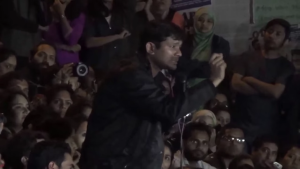“So often we overlook the work and the significance of those who are not in professional jobs, of those who are not in the so-called big jobs,” Martin Luther King Jr. had said to striking sanitation workers in Memphis, Tennessee, in 1968. “But let me say to you tonight, that whenever you are engaged in work that serves humanity and is for the building of humanity, it has dignity, and it has worth.”
Everyone who works to earn an honest living deserves respect. Your profession or work alone shouldn’t decide your place in the society. A person should be looked at in a more holistic manner for what he contributes to the society. Every profession is respected, and there must be dignity of labor.

Across many developing countries, including India, the concept of dignity of labor is yet to permeate within the society.
In developed nations such as the US, people aren’t looked down for taking up jobs that require labor. People are more respectful to each other despite their jobs and income gap. A plumber isn’t a lowly man just because of his trade. Instead, a plumber is treated with dignity for his / her contributions.
Similarly, a locksmith is a tradesman and a local business. He works in an industry that’s pretty well regulated in most states of the United States. Locksmiths need proper license and training in states such as California. Those who operate locksmith shop in San Diego and other places in California also get contractor licenses and insurance as per law mandates. A locksmith could be a strong pillar of the local business community.
In contrast to the developed countries, a locksmith doesn’t really get much respect as a contributor to the society. A locksmith and other labor class workers are considered inferior by those who work for top companies and operate other businesses.
Let alone locksmiths. A plumber or an electrician is also not considered any better than a locksmith. All these people contribute towards development of the society. Yet, the labor class doesn’t get to the dignity they deserve. They are always considered second-grade citizens.
This faulty thought process needs to change. Each and every person deserves to be respected as a fellow human being. Those who engage in physical labor build our societies with their sweat and hard work. Their grueling labor cannot be left unrecognized. They need to be accepted as equals by those who enjoy other jobs. The divide of the labor class and the rest of the society needs to be bridged. One shouldn’t force the labor class to live in ghettos. Instead, they should be accepted as friends and acquaintances. A security guard or an electrician deserves respect and friendship of those who seek his services too.
A nation can not prosper materially if the people aren’t laborious. Labour is at the source of the power of nation. A nation that can not work hard, nation that doesn’t admire the quality of homemade labour lags behind the progressive nations. After the artificial revolution the people of Europe learnt to work with tools and machines. The material substance of a country depends on the progress of its husbandry, assiduity and trade.
The concept of dignity of labor could be seen as early as the 19th century. People had started to speak about the need to respect those who toil.
Here’s an excerpt from an article published in 1853:
We know it is no uncommon feeling among all classes of rich and poor, to make wide distinctions, one looking down or up to another because of its particular profession or trade. Great excellence in mechanism, skill of hand, and mental ability will always command admiration, but the feeling we would desire to see generally cultivated, is respect for all wise and honest men irrespective of their kind of labor… It is also as incumbent upon every American mechanic to be a gentleman, as if he were a minister or professor; there is no excuse for any of our mechanics being less than gentlemen, and certainly some of them are much finer gentlemen than many who ride in their carriages.
The advocacy for dignity of labor still continues in countries such as India. The shackles of old thoughts are yet to e broken in a country where exclusion was deeply entrenched within the society and people segregated into a caste system based on their trade.





